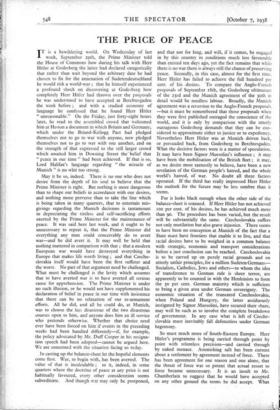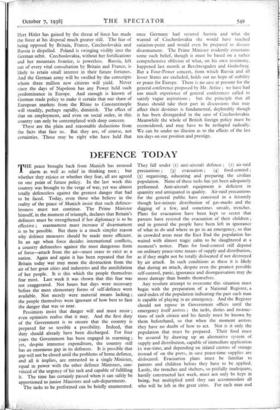THE PRICE OF PEACE
TT is a bewildering world. On Wednesday of last A week, September 29th, the Prime Minister told the House of Commons how during his talk with Herr Hitler at Godesberg the latter had declared categorically that rather than wait beyond the arbitrary date he had chosen to fix for the annexation of Sudetendeutschland he would risk a world-war ; that he himself experienced a profound shock on discovering at Godesberg how completely Herr Hitler had thrown over the proposals he was understood to have accepted at Berchtesgaden the week before ; and with a studied economy of language he confessed that he found Herr Hitler " unreasonable." On the Friday, just forty-eight hours later, he read to the assembled crowd that welcomed him at Heston a document in which Britain and Germany, which under the Briand-Kellogg Pact had pledged themselves not to go to war with anyone, now pledged themselves not to go to war with one another, and on the strength of that expressed to the still larger crowd which awaited him in Downing Street the-belief that " peace in our time " had been achieved. If that is so, Lord Halifax's language regarding " the miracle of Munich " is no whit too strong.
May it be so, indeed. There is no one who does not desire from the depth of his soul to believe that the Prime Minister is right. But nothing is more dangerous than to shape our beliefs in accordance with our desires, and nothing more perverse than to take the line which is being taken in many quarters, that to entertain mis- givings regarding the Munich decisions is tantamount to depreciating the tireless and self-sacrificing efforts exerted by the Prime Minister for the maintenance of peace. It was said here last week, and it ought to be unnecessary to repeat it, that the Prime Minister did everything any man could conceivably do to avert war—and he did avert it. It may well be held that nothing mattered in comparison with that ; that a modern European war would have destroyed everything in Europe that makes life worth living ; and that Czecho- slovakia itself would have been the first sufferer and the worst. No part of that argument need be challenged. What must be challenged is the levity which assumes that to have averted war is to have averted all serious cause for apprehension. The Prime Minister is under no such illusion, or he would not have supplemented his declaration of belief in peace in our time with insistence that there can be no relaxation of our re-armament efforts. All he did, and all he could do, at Munich, was to choose the less disastrous of the two disastrous courses open to him, and anyone does him an ill service who pretends otherwise. Whether that choice need ever have been forced on him if events in the preceding weeks had been handled differently—if, for example, the policy advocated by Mr. Duff Cooper in his resigna- tion speech had been adopted—cannot be argued here. We are concerned with the situation facing us today.
In casting up the balanCe-sheet let the hopeful elements come first. War, to begin with, has been averted. The value of that is incalculable ; to it, indeed, in some quarters where the doctrine of peace at any price is not habitually favoured, every other consideration seems subordinate. And though war may only be postponed, and that not for long, and will, if it comes, be engaged in by this country in conditions much less favourable than existed ten days ago, yet the fact remains that while there is no war there is always still the chance of preserving peace. Secondly, in this case, almost for the first time, Herr Hitler has failed to achieve the full hundred per cent. of his desires. To compare the Anglo-French proposals of September 18th, the Godesberg ultimatum of the 23rd and the Munich agreement of the 3oth in detail would be needless labour. Broadly, the Munich agreement was a reversion to the Anglo-French proposals —but it must be remembered that those proposals when they were first published outraged the conscience of the world, and it is only by comparison with the utterly outrageous Godesberg demands that they can be con- sidered to approximate either to justice or to expediency. Nevertheless Herr Hitler was at Munich driven back, or persuaded back, from Godesberg to Berchtesgaden. What the decisive factors were is a matter of speculation. It may have been Signor Mussolini's influence ; it may have been the mobilisation of the British fleet ; it may, as we desire most earnestly to believe, have been a new revelation of the German people's hatred, and the whole world's hatred, of war. No doubt all three factors operated. If the third has really impressed Herr Hitler the outlook for the future may be less sombre than it seems.
For it looks black enough when the other side of the balance-sheet is scanned. If Herr Hitler has not achieved roo per cent. of his desires, he has achieved much more than 9o. The procedure has been varied, but the result will be substantially the same. Czechoslovakia suffers not only mutilation but also grave injustice. There seems to have been no conception at Munich of the fact that a State must have frontiers that enable it to live, and that racial desires have to be weighed in a common balance with strategic, economic and transport considerations before a just conclusion can be reached. Czechoslovakia is to be carved up on purely racial grounds and on utterly unfair principles, for a million Sudeten Germans— Socialists, Catholics, Jews and others—to whom the idea of transference to German rule is sheer terror, are apparently to be counted in with the Henleinists to form the 5o per cent. German majority which is sufficient to bring a given area under German sovereignty. The economic situation of the truncated Czechoslovakia, when Poland and Hungary, the latter assiduously instigated by Signor Mussolini, have secured their share, may well be such as to involve the complete breakdown of government. In any case what is left of Czecho- slovakia must inevitably fall defenceless under German hegemony.
So must much more of South-Eastern Europe. Herr Hitler's programme is being carried through point by point with relentless precision—and carried through by naked menace. Astonishing talk has been current about a settlement by agreement instead of force. There has been agreement for one reason and one alone, that the threat of force was so potent that actual resort to force became unnecessary. It is an insult to Mr. Chamberlain to suggest that he would have accepted on any other ground the terms he did accept. What Herr Hitler has gained by the threat of force has made the force at his disposal much greater still. The fear of being opposed by Britain, France, Czechoslovakia and Russia is dispelled. Poland is swinging visibly into the German orbit. Czechoslovakia, without her fortifications and her mountain frontier, is powerless. Russia, left out of every vital consultation by Britain and France, is likely to retain small interest in their future fortunes. And the German army will be swelled by the conscripts whom three million new citizens will yield. Never since the days of Napoleon has any Power held such predominance in Europe. And enough is known of German trade policy to make it certain that our share of European markets from the Rhine to Constantinople will steadily, perhaps rapidly, diminish. The effect of that on employment, and even on social order, in this country can only be contemplated with deep concern.
These are the plain and reasonable deductions from the facts that face us. But they are, of course, not certainties. Those may be right who have held that once Germany had secured Austria and what she wanted of Czechoslovakia she would have reached satiation-point and would even be prepared to discuss disarmament. The Prime Minister evidently entertains some such belief, though it must be based on a rather comprehensive oblivion of what, on his own testimony, happened last month at Berchtesgaden and Godesberg. But a Four-Power concert, from which Russia and all lesser States are excluded, holds out no hope of stability or peace for Europe. There is no case at present for the general conference proposed by Mr. Attlee ; we have had too much experience of general conferences called to satisfy vague aspirations ; but the principle that all States should take their part in discussions that may affect their destinies is fundamental, deplorably though it has been disregarded in the case of Czechoslovakia. Meanwhile the whole of British foreign policy must be reconsidered, and may have to be reshaped radically. We can be under no illusion as to the effects of the last ten days on our position and prestige.















































 Previous page
Previous page